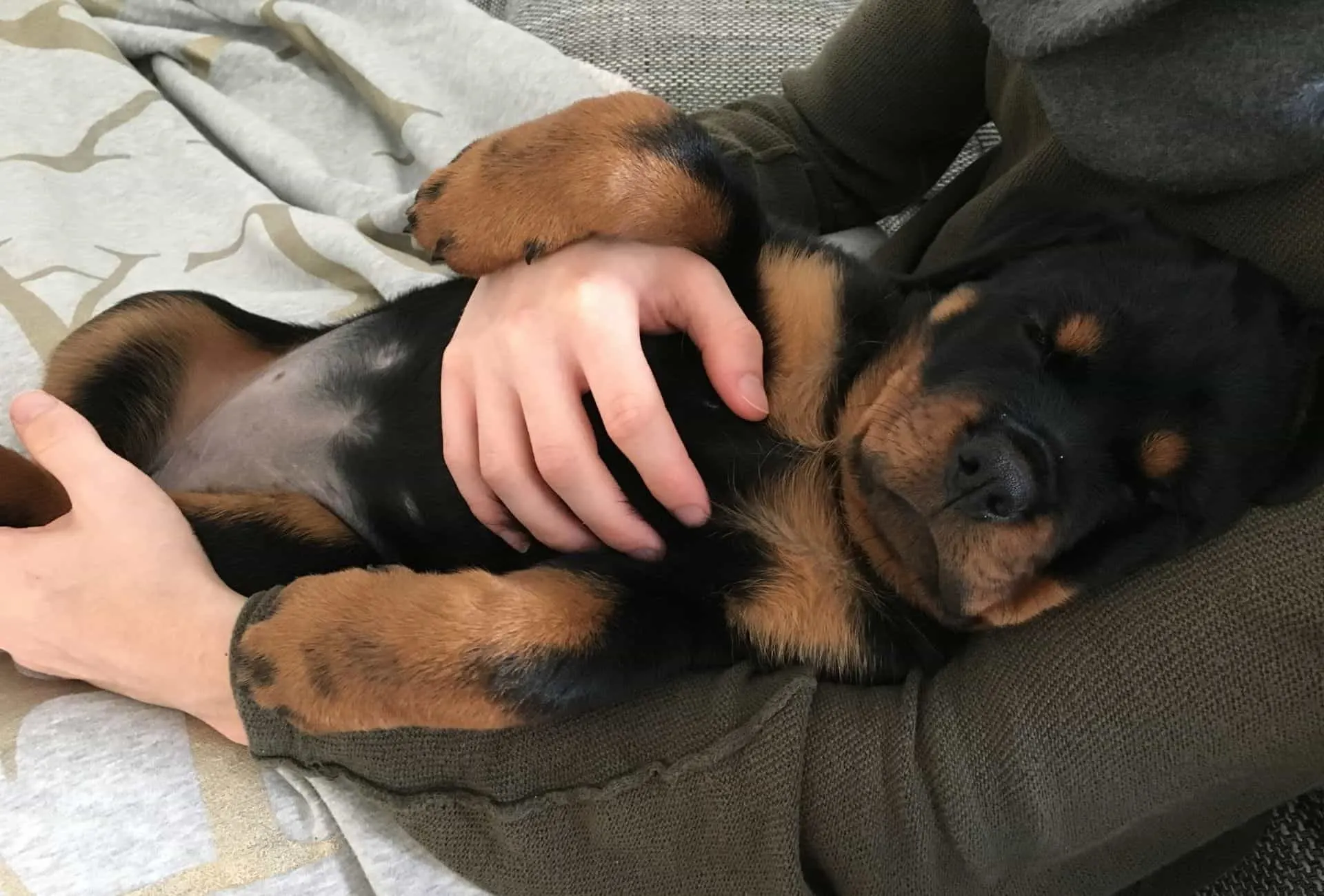Among many other human-like characteristics, sleepy whimpering is the one that makes you wonder whether dogs have such vivid dreams as we do – probably even more so.
A dog whimpering in sleep is usually just verbal communication on a subconscious level.
Except for dreaming, there are a few other things that might trigger this not-so-odd canine behavior.
With the help of this article, you can check what category your dog falls under and if the whimpering is concerning or just super cute.
After all, sleep is crucial for a dog’s cognitive development1,2 so it might be smart to let sleeping dogs lie, right?
Causes for Dog Whimpering in Sleep
The main cause why dogs whimper in their sleep is dreaming but seizures or pain should be ruled out as possible causes. When the dog is technically awake but sleepy, you might hear whimpering due to boredom or anxiety.
Dogs never whine and whimper in their sleep without a cause.
The reason might not be noticeable or relevant to the dog’s health and well-being, but it’s still there.
Thankfully, most cases are nothing to worry about.
Whimpering may be accompanied by twitching and while being a seemingly benign issue it sometimes requires closer attention because some of the theories we are going to describe might come as a surprise.
Dreaming
Dogs spend almost half of the day sleeping, and puppies and elderly canines even more.
The phases of a dog’s sleeping cycle are very similar to human ones so you might expect your dog to go through deep sleep and the REM (Rapid Eye Movement) phase.
Whimpering while sleeping happens during the REM phase because this is the period when they dream.

Dream frequency and length may be related to the dog’s size, sleep location, and activity level.3
A toy poodle may dream every 10 minutes, while a Labrador Retriever may only dream once every 60-90 minutes.
However, the poodle’s dreams may last only a minute while the Labrador’s dreams may be 5-10 minutes long.
By Ryan Llera, BSc, DVM; Lynn Buzhardt, DVM via VCA Hospitals
Whimpering, crying, and even growling are quite normal when there is a peak in brain activity.
Even though it may appear violent or uncomfortable it doesn’t necessarily mean that your dog is having a nightmare.
One can never be sure what our beloved furry friends are dreaming about.
We can only guess they are reliving some casual situations that happened throughout the day.
Even if it’s a scary dream, the activity should go uninterrupted because dreaming contributes to healthy mental activity.
An average-sized dog has his first dream approximately 20 minutes after falling asleep, according to Stanley Coren’s article on Psychology Today.
When the dream starts the breathing becomes irregular and shallow, the muscles start to twitch and the eyes move fast behind the closed eyelids.4
Puppy Behavior
Whimpering and whining in sleep is an expected puppy behavior.
Puppies are loudest the first week or two after they get separated from their mothers and littermates.
The reason why pups whimper when awake is the need for attention and company
Puppies can also get especially twitchy in their sleep – a lot more than adult dogs.
One theory on why puppies twitch more in their sleep mentions that their potentially underdeveloped brain stem responsible for sending muscle-relax signals is less efficient in keeping their bodies calm.5
Excessive twitching and puppy whimpering go away on their own eventually.
I know it’s hard to ignore the whining but you should refrain from reacting.
At best, you won’t do anything because your pup is sleeping.
Worst case you’re just waking your puppy or even encouraging the whining if he’s barely awake.
You never want to positively reinforce whining to get attention or interrupt their sleep.
Seizure Episodes
Twitching and vocalizing while sleeping can be symptoms of seizures and other disorders of the nervous system.
While the type of whimpering can’t help you distinguish dreaming from seizures, the intensity of twitching can.
Kicking and paddling legs in seizing dogs are a lot more rigid and stiffer and with that, the movements appear a lot more violent.
Some dogs defecate and urinate while experiencing a sleeping seizure which is rarely a case in dreaming dogs.
After a seizure, the animals seem disoriented and may breathe hard and drool a lot.
If you suspect that seizure episodes are the problem for your dog whimpering in sleep, talk to your veterinarian as soon as possible.
Painful Medical Issues or Discomfort
Dogs are experts at hiding their pain, but some dogs may seem to whine obsessively when in pain.
When older dogs with chronic joint pain or other dogs with any sort of painful condition lay down against a surface putting extra pressure on the point of pain they may whimper in their sleep.
It’s very hard for a dog in pain to have a good night’s sleep and get the rest he needs and deserves.
When you think there is a chance that pain is the reason for your dog whimpering in sleep, take him to the vet for a thorough check-up.
Rule out pain as a possible cause before you continue to investigate other reasons for whimpering in sleep.
One of the most uncomfortable health problems in dogs is bloat.
Dogs get bloated for many reasons – bad food, suboptimal feeding schedule, and foreign bodies can all contribute to excessive gas accumulation.
When the gas builds up to a point where the stomach and intestines cannot be distended, any further discomfort is unbearable.
A bloating dog may have a hard time sleeping, especially if he lies directly on the abdomen.
The condition is very serious and can turn into a disaster very quickly.
In the end, it’s unlikely that a dog is whining in their sleep due to an issue related to bloat, but it may be something to keep in mind if you notice other symptoms.
Boredom
All dogs need regular daily exercise to get enough physical and mental engagement and stimulation.
Sadly, many owners can’t meet their dog’s needs for sufficient exercise.
Every healthy dog should enjoy at least 60 minutes of exercise daily (not limited to walks, your dog can swim for exercise too).

It’s likely for your dog to get bored by his daily routines if you don’t take him out to play often enough.
Boredom can be expressed when everyone goes to sleep and the dog starts whining and whimpering for no obvious reason.
In rare cases, some dogs express these emotions with their eyes closed or in a sleepy state so it may seem like they are whimpering while sleeping.
Once you start exercising your dog (mentally as well as physically) and the whimpering stops, you’ve pinpointed the cause.
It’s needless to say that more frequent exercise routines will solve the problem when boredom is the cause.
If you have a puppy, check my article to see how much exercise is safe for puppies.
Separation Anxiety (or any other type of anxiety)
Many dogs are overly attached to their owners and start whining when they get separated, hence the term separation anxiety.
You are not letting your pup sleep in the same bed with you? Whining starts.
Separation anxiety is a common problem and instead of opting for medications, you should start training right away if you notice symptoms.
Separation isn’t the only reason for late-night whimpering, but also any other trigger (ex. storms) that makes your pet anxious and afraid.
Improper Training
Dogs can keep on whining and whimpering during the night throughout their whole lives if they haven’t been trained to stop.
Most dogs stop as they get older, but some don’t. Enrolling whimpery dogs in behavioral classes early on can put an end to the problem.
Why is My Dog Crying at Night All of a Sudden?
Reasons why your dog is crying at night all of a sudden include dreams, loneliness, anxiety, storms, pain, discomfort, and fear.
Although you can’t be sure what happened exactly with only one crying incident, closely observing repetitive episodes can give you an idea of what to suspect according to the symptoms I mentioned before.
Is My Dog Having a Bad Dream?
Bad dreams make people annoyed, distressed, fearful, and anxious once they are awake.
Unfortunately, there is no way to tell whether your dog had a bad dream or a regular dream if he whimpered, cried, or growled while sleeping.
Even when they wake up and you can sense anxiety and alertness in them, it’s not a guarantee that the dog was having a nightmare.
Should I Wake My Dog Up from a Bad Dream?
While many owners are tempted to wake their dogs up from what seems like a bad dream, it’s best if you just let your pet dream on.
Disrupting REM sleep can have serious mental consequences.
Also, if you touch your dog during an active dream he may involuntarily bite or scratch (my dog never does but I have seen anxious dogs doing it).
The only time you can attempt to wake a dog up is when you are not sure if it’s a dream or a seizure that’s going on.
In this case, instead of touching your dog, call out his name loudly or drop an object on the floor.
If the dog wakes up right away it was just a dream and you need to start talking softly and reassure him that it was just a startle.
Not waking up after the loud commotion could indicate a seizure causing involuntary noises and movements.
All else aside, your dog’s whimpering may just be a good old dream.
Thinking your half-sleepy dog has some attention issues or boredom? You can start training at home right away!
However, when it comes to possible medical issues, you should consult your vet.
Sources
The first four links lead to research hailing from Hungary, conducted between 2017-2019.
- Science Direct, 2019: Sleep in the dog: comparative, behavioral and translational relevance
- Nature.com, 2017: The interrelated effect of sleep and learning in dogs (Canis familiaris); an EEG and behavioural study
- National Library of Medicine, 2018: Differences in pre-sleep activity and sleep location are associated with variability in daytime/nighttime sleep electrophysiology in the domestic dog
- Springer Link, 2018: Rapid eye movement density during REM sleep in dogs
- Live Science, 2016: What Do Dogs Dream About?

melody
Thursday 20th of January 2022
my puppy is 4 weeks old and tonight is her first night and shes in bed with me but shes been sleeping and whining does she miss her mom
Danielle
Friday 21st of January 2022
Hi Melody, the article mostly revolves around a different situation, yours sound like the usual puppy whining which is most often seen when people try to crate train their pup or want they want attention.
It's natural for a dog to miss the home they come from (including people, siblings, and the mom) but it's important to start training right away.
That being said, 4 weeks is definitely too early for your pup to be away from her mom. Even if the pup comes from a shelter, they should have other options in place. A breeder should never ever hand out a puppy under 8-10 weeks (some may opt for 7 1/2 weeks).